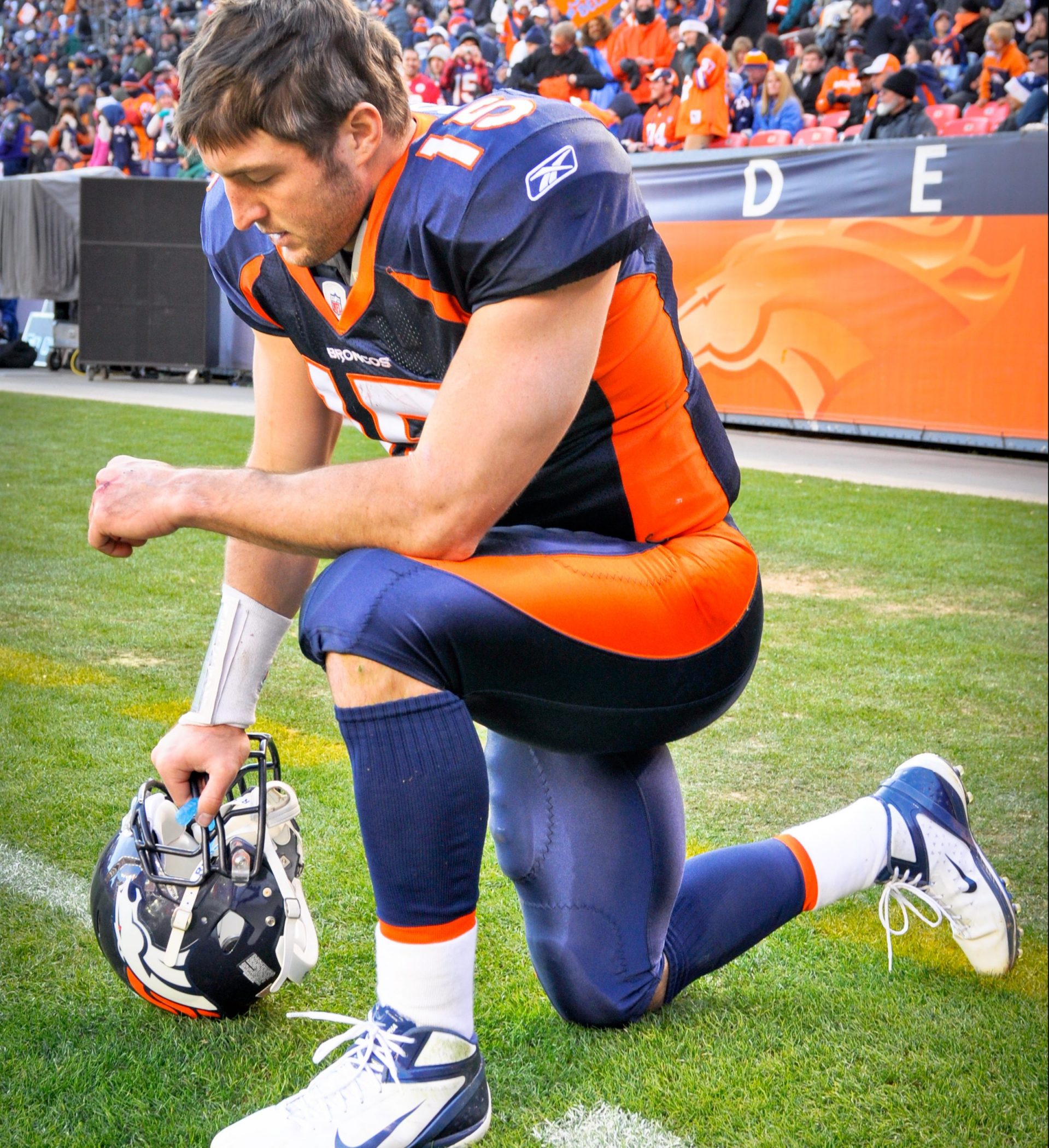By E.D.
Colin Kaepernick, former quarterback of the San Francisco 49ers, has a tattoo on his right bicep that displays Psalm 18:39: “You armed me with strength for battle; you humbled my adversaries before me.” A significant number of professional athletes, from Tim Tebow to Steph Curry, publicly attribute their success in sports to the glory of God.
Kaepernick’s tattoo of a Bible verse on his bicep is an example of “muscular Christianity.” This movement originated in the nineteenth century among church leaders who believed their young boys to be too feminine and encouraged schools to toughen boys up for the intense reality of the physical world. Years later, the connection between public displays of athleticism and a strong Christian faith has become so resolute in American society that Christianity is almost indistinguishable from “muscular Christianity.”
Both avid Christians and former NFL quarterbacks, Kaepernick and Tim Tebow share another thing in common: kneeling.
Gerome Sapp, former football player, posted an Instagram post in early 2018 comparing the kneeling styles of Kaepernick and Tebow. He said of the latter: “Let’s not forget about Tim Tebow… [who] kneeled in protest of abortion during the National Anthem in 2012 and was praised by fans for being a ‘model American’….” Sapp critiqued the National Football League and its supporters for their hypocritical support of Tebow and rejection of Kaepernick.
However, as the fact-checking organization Snopes describes, Tim Tebow was not protesting abortion when he took a knee at NFL games. Rather, he was kneeling to humble himself in prayer during inconsequential moments in his games, a popular fad once known as “tebowing.”
Although untrue, it is believable that Tim Tebow might have knelt in protest of abortion, as he has publicly expressed pro-life views. Focus on the Family, a Christian pro-life advocacy group, once ran an anti-abortion ad featuring Tim Tebow and his mother during the 2010 Super Bowl. Tebow regarded his Christian and pro-life views as one and the same, and felt it was within his rights to express both on his public platform.
As a black and Christian American, Kaepernick also felt it was well within his rights to address all aspects of his identity on his public platform. In 2016, Kaepernick began to kneel during the traditional pre-game play of the National Anthem in protest of police brutality against black Americans, sparking a nationwide trend. To Kaepernick, his public protest was no different than his public displays of faith. But many Americans, specifically conservative NFL fans, did not agree. Donald Trump later called for the expulsion of those “sons of bitches” from the NFL.
Gerome Sapp’s tweet is an attempt at describing the hypocrisy of Tebow’s prayer and Kaepernick’s protest. Many people, outraged by this double-dealing, looked for an easy way to point out the issue, found it in Sapp’s tweet, and spread the false information across the internet.
A search on Twitter for some combination of the items “Tim Tebow,” “abortion,” and “kneeling” yields hundreds if not thousands of results from early 2018 to up until the present. Many of these tweets utilize the same, false comparison originally made by Gerome Sapp. A tweet by Twitter user @drecsr garnered over 3000 retweets and likes, even though the image he posted was actually a screenshot from the aforementioned Snopes article.
Tweets by accounts such as @geromesapp and @drecsr, as well as hundreds of other similar posts, are part of a larger trend in today’s society. By strengthening their argument with a piece of false information, these accounts can bolster the element of outrage that cause people to like and retweet. Twitter users don’t need much more than a picture of “tebowing” to decide that it would probably make sense for Tebow to protest abortion. However, Tebow was not actually protesting anything, he was simply praying.
Still, why is public prayer so much more acceptable than public protest?
The answer lies in a particularly American concept: athletes ought to stick to their roles as entertainers. When we sit down on the couch with our soda and nachos to watch the Super Bowl, we don’t want to be faced with the deplorable aspects of our society. We don’t really want to reckon with the reality of police brutality before we watch grown men tackle each other to the ground for our entertainment. Perhaps we also don’t want to watch an anti-abortion ad during the commercial break, but we accept it since it’s not technically part of the game. Prayer is much more digestible for an audience because it can be understood as one player’s strategy to win in the game.
Public prayer, as a symptom of muscular Christianity, only serves to demonstrate the glory of God, by way of the athlete. It strengthens the image of the institution by promoting supposedly American values. Protest does not serve to strengthen the values of its institution because it is an admittance of failure on their part. In this case, Kaepernick’s protest highlights the failure of American law enforcement. But it also broadcasts the failure of the NFL to address the issues that relate directly to the identities of the individual athletes off of whom the NFL makes its money. It’s dangerous for the NFL when an athlete cares about anything more than winning. Sure, Kaepernick might win in the game, but his country and his communities are still losing if nothing changes.
On the internet, we also want to win our own games. We want to win arguments against those with differing opinions. Perhaps we all want to feel as if we are creating the same amount of social change as Colin Kaepernick. But this kind of thinking gets in the way of the validity of our arguments, when we choose to rely on our own confirmation bias rather than facts. Seeing is not always believing; a person kneeling might not be protesting; a “fact” we see might not always be true.
